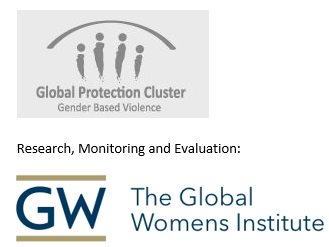- The IASC GBV Guidelines outline actions relevant to the security sector in the early stages of an emergency, and specify the importance of appointing focal points from the security sector to participate in VAWG coordination mechanisms. Even in the early stages of humanitarian response, VAWG experts can begin to work with security actors to support the establishment of safe and ethical services and to undertake advocacy with relevant leaders to improve security sector capacity.
- During an emergency, the priority is to ensure that there are sufficient security actors on the ground monitoring the safety of affected populations. Key responsibilities outlined in the IASC GBV Guidelines include:
- Encourage authorities to strengthen security, as well as law and order arrangements, in the affected areas:
- Ensure there are adequate numbers of properly trained police and security personnel who are accountable for their actions.
- Establish short-term security objectives and indicators for minimum prevention and response to violence against women and girls.
- Develop strategies for monitoring security to identify high-risk areas and other security issues.
- Where necessary, address capacity-building needs in terms of training of security personnel in basic human rights and VAWG issues, as well as in responding to incidents.
2. Establish community-based strategies for improving security, combining a targeted, proactive presence around specific “hotspots” with a less routine, widespread, and mobile presence that gives protected persons and potential violators a sense that someone is “always around.” Tactics might include:
- Community watch programmes and/or security groups;
- Security patrols;
- Community centres/women’s centres/safe shelters;
- Regular and frequent presence of international protection staff in communities (camps, villages).
3. Promote confidence-building between police/security forces and the community by:
- Increasing the numbers of female police;
- Facilitating meetings and information sharing between security personnel and the community.
4. Coordinate with all security partners to disseminate information on the availability and value of sexual violence response services.
5. Provide security when survivors report incidents to police and/or other security personnel.
- Always respect the confidentiality, rights, choices, dignity, and confidentiality of the survivor, ensuring that she is involved in any decisions or action to be taken regarding her protection.
- Conduct interviews in private spaces and, preferably, with female interviewers.
- Ensure protocols are in place for referrals to other sectors, including for safe shelter.
- Work in conjunction with cultural leaders, authorities, and women’s groups to counter victim-blaming and stigmatization.
6. Establish mechanisms to maximize safety and security of all who provide help and assistance to survivors, including humanitarian actors and community members.
7. Provide guidance to the GBV coordination mechanism on how to prevent future incidents of sexual violence. This requires monitoring and analyzing security through a network of contacts, anecdotal information, and data compiled about reported incidents of sexual violence.
